|
|
|
| |
ARST SpA (Trasporti Regionali della Sardegna)
This page is still under
construction
All images link to larger
copies which will open in a new window/tab
|
|
|
This page shows images of the Ferrovie della Sardegna
(Sardinian Railways),
the 950mm
gauge lines of Sardegna (Sardinia) operated by ARST Gestione FdS, later ARST SpA
(Trasporti Regionali della Sardegna).
Three 950mm gauge railway systems remain in operation in
Sardegna, located in the north, west and south-east of the
island. A fourth network existed in the south-west, but this
system is now closed. There are five lines which continue to
provide regular daily public transport services. Some of these
are being modernised and even electrified. In addition, four
connected sections run tourist services in summer. These
typically run just once a week using diesel-hauled trains, since
there were problems with steam locos causing fires.
I have made visits on cruises to Alghero and Cagliari, allowing
some photography of the systems in the north and south-east. I
have not visited the system based on Macomer in the west.
Table of Operating
Railway Lines in Sardegna
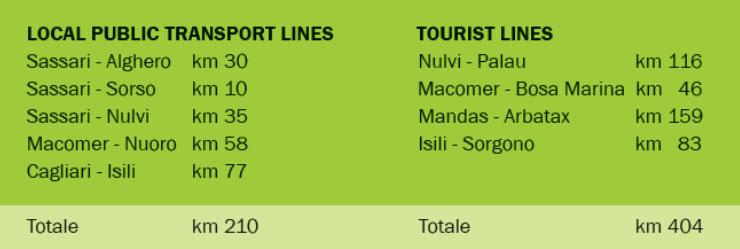
A Brief History of 950mm Gauge Railways in Sardegna
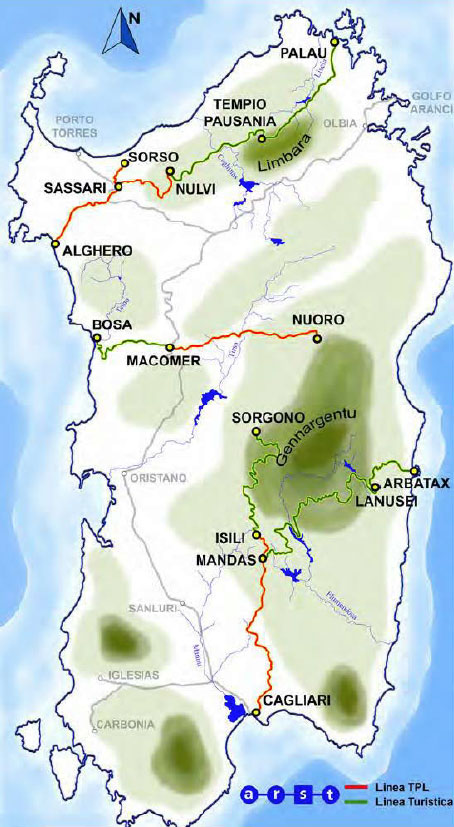 The 950mm gauge railway from Cagliari running north
to Isili and Sorgono was opened by the Strade Ferrate Secondarie della
Sardegna (SFSS) in 1889. The section from Isili to Sorgono is now only used
by occasional tourist trains. A long branch was also built from Mandas to
Arbatax on the coast, also still available for tourist trains. The 950mm gauge railway from Cagliari running north
to Isili and Sorgono was opened by the Strade Ferrate Secondarie della
Sardegna (SFSS) in 1889. The section from Isili to Sorgono is now only used
by occasional tourist trains. A long branch was also built from Mandas to
Arbatax on the coast, also still available for tourist trains.
A second
company began operations in 1915, when the Ferrovie Complementari della
Sardegna (FCS) opened a link from the SFSS to Villacidro and Ales (now
closed). The ambitious FCS took over the SFSS in 1921 and also opened a line
from Alghero to Sassari.
A third company Strade Ferrate de Sarde (SFS)
opened other lines in the north from Sassari to Nulvi and Palau Marina plus
a short line to Sorso. In 1947, both FCS and SFS were taken over by
Rome-based La Ferrotranviaria. FCS and SFS remained independently managed,
but the FCS lines in the north were transferred to the SFS.
A fourth narrow
gauge system was the Ferrovie Meridionali Sarde (FMS) in the south west,
linking Calasetta to Iglesias and Siliqua, both on the standard gauge FS
system, opened to exploit coal in the area as late as 1926.
FCS and SFS modernised their passenger services with railcars in the late
1950s. These Fiat AD railcars are substantially-built, mainly
diesel-electric vehicles. They are capable of 75kph and the upgraded tracks allow
such speeds to be maintained. Their superb streamlined ends are very
distinctive and they were completed in various batches for the different
Sardinian railways FCS, SFS and FMS between 1957-59, with the SFS deliveries being
diesel-mechanical. Matching control trailers run with the power cars. Six standard Fiat ADe railcars were also delivered to the FMS in
1959 after their takeover by the state in 1952. All the
collieries had closed by 1960 and FMS passenger services ceased in 1969 and
1975. The FMS railcars passed to the FCS in 1975. The FMS railcars had different
gearing to those delivered to FCS and SFS, allowing a top speed of 90kph.
In 1989 the FCS and SFS were taken over by the local government to form
Ferrovie della Sardegna (FdS), since 2008 know as ARST Gestione FdS and
later ARST SpA (Trasporti Regionali della Sardegna). Some
more angular railcars were built for FdS by Breda in 1995/96.
|
|
|
|
|
|
ARST SpA (Trasporti Regionali della Sardegna)
All images link to larger
copies which will open in a new window/tab
I visited Cagliari in October 2010 on the
Celebrity
Eclipse of
Celebrity
Cruises.
In Cagliari the trains originally ran to a station at Repubblica, a
trolleybus ride from the docks. The Monserrato to Repubblica section is now
used by the Cagliari Metro. A
short extension links the original FdS Monserrato-Stazione to the new Metro
station at
Monserrato-Gottardo. We travelled to
Monserrato-Gottardo
on the Metro and found the
station to be unstaffed and with no timetables for any FdS services running.
Most trains do not stop at Monserrato-Stazione although it maintains station
staff and has a buffet/bar, but we walked there to find out what train services, if any, were
running. The FdS website had mentioned that track upgrading was taking
place on Saturdays.
The friendly station master appeared to indicate that
all services were by bus. Normal services are three daily returns to Isili
(2hr 35min), four more as far as Mandas (1hr 15min), and four short returns
to Dolianova (25min). If trains had been running we would probably only have had
time only to go to Dolianova. Added to our disappointment at the lack of
trains, the Monserrato railway museum was also shut on Saturdays (although
the website suggested otherwise).
At this point a railcar arrived and rattled through the station round to
Gottardo. We then discovered that better communication was possible with the
station master in French. He explained that the train only ran 4km to
Settimo, before transfer to the bus. This was better than nothing and we
bought return tickets to Settimo. The station master contacted the train
so that it would make a special stop to pick us up. At Settimo the few
passengers transferred to a bus and we had 20 minutes to wait until the
return to Monserrato-Gottardo. We then returned by tram and trolleybus to
the town centre.
Helpful staff at FdS
Monserrato-Stazione
Photos: © Ian Boyle,10h October 2010
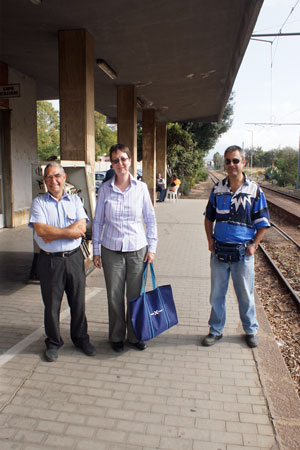
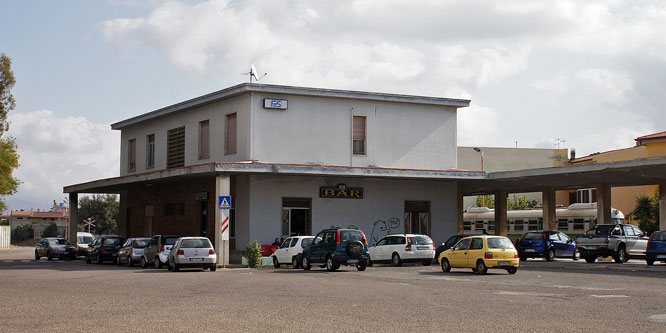
Believing there were only buses
running, we were surprised when this wonderful FIAT railcar ran through the
station without stopping
Photos: © Ian Boyle,10h October 2010
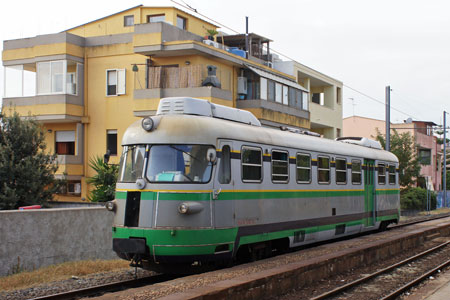
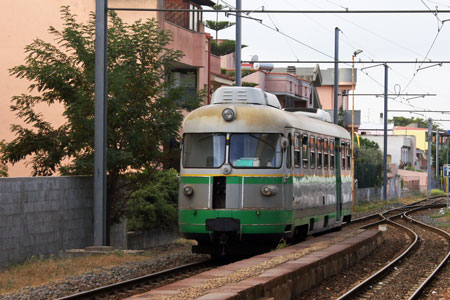
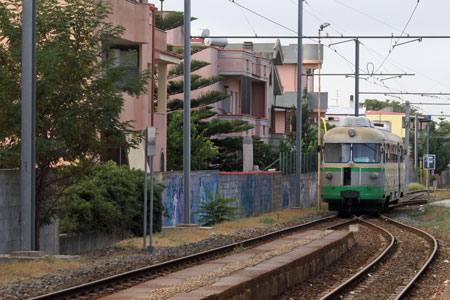
Having made arrangements for the
train to stop specially for us, we boarded the FIAT
Photos: © Ian Boyle,10h October 2010
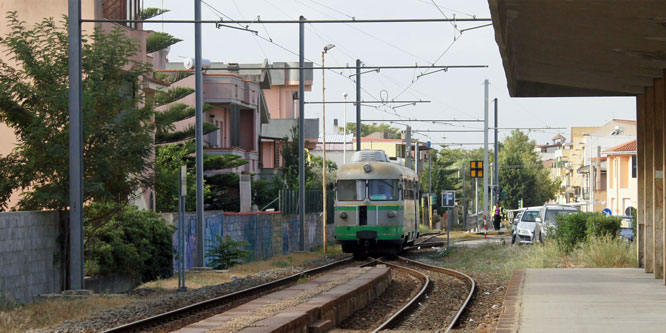
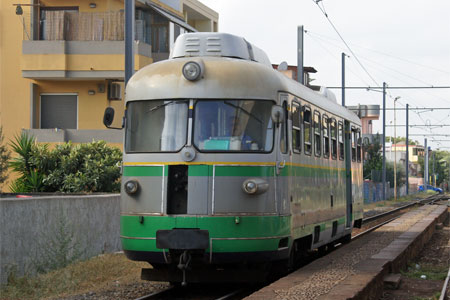
There was nothing to see at
Settimo, but we only had 20 minutes to wait before returning to Monserrato
Photos: © Ian Boyle,10h October 2010
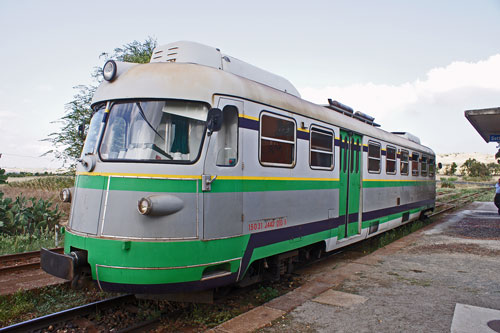
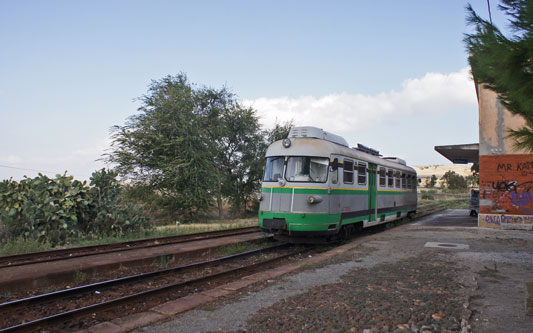
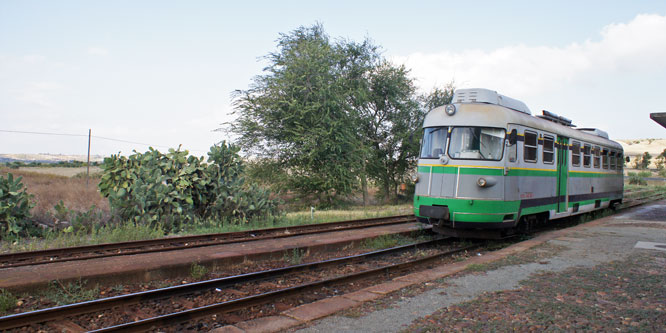
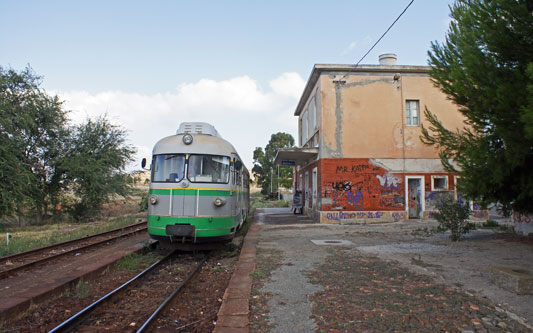
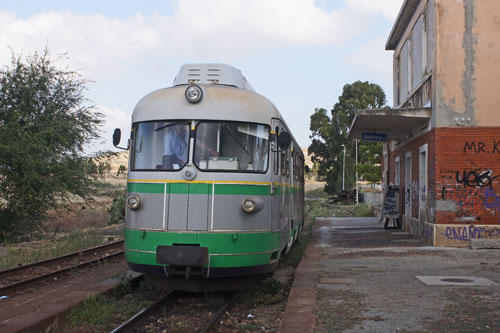
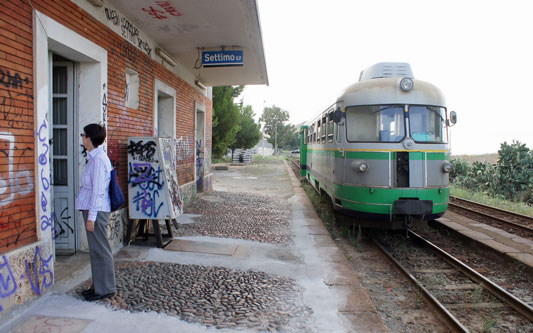
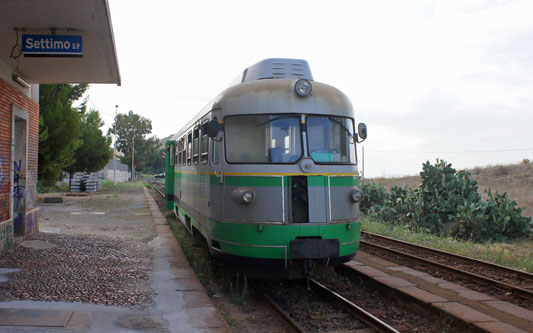
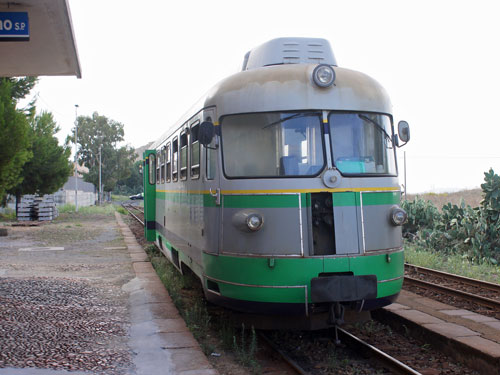
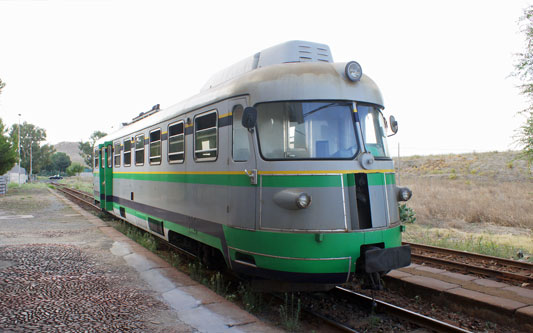
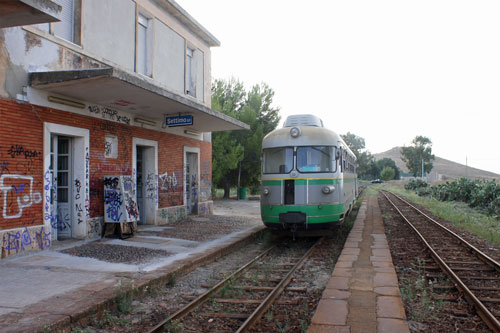
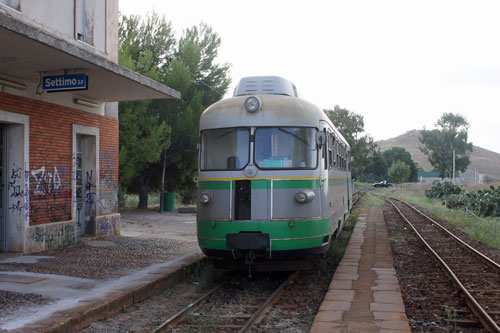
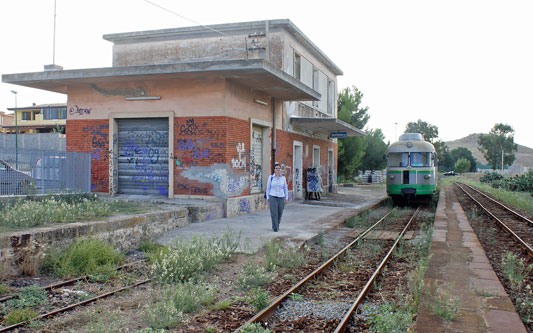
The fairly desolate view from
Settimo, but the track from beyond the loops had all been renewed
Photos: © Ian Boyle,10h October 2010
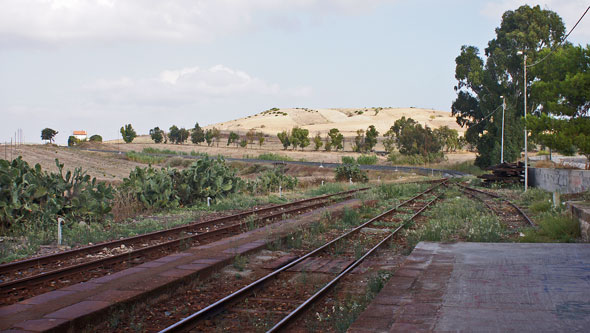
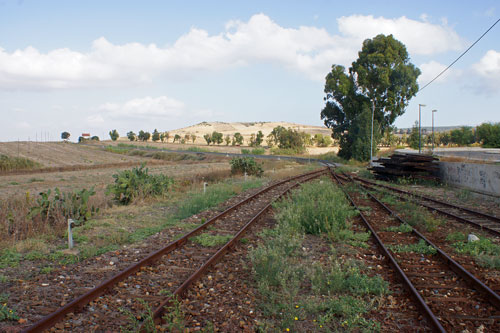
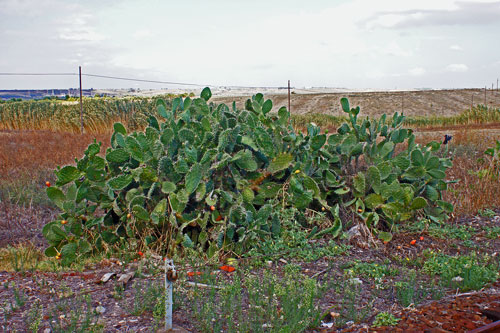
More images at Settimo
Photos: © Ian Boyle,10h October 2010
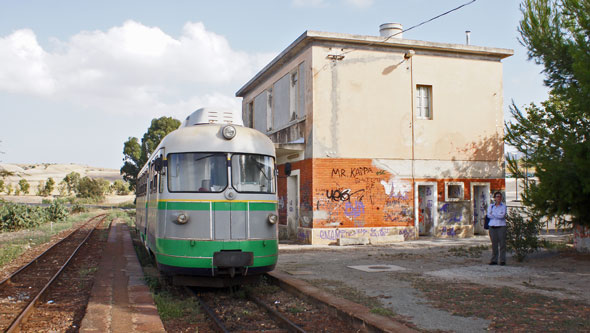
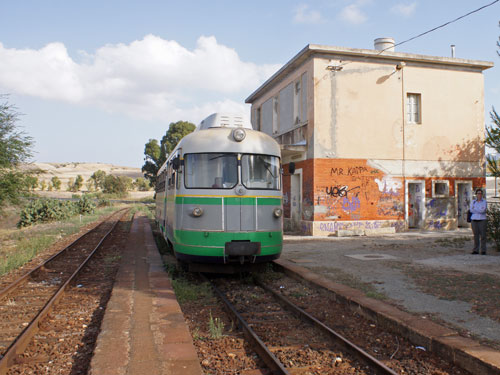
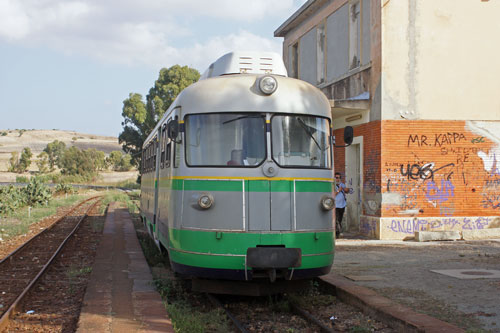

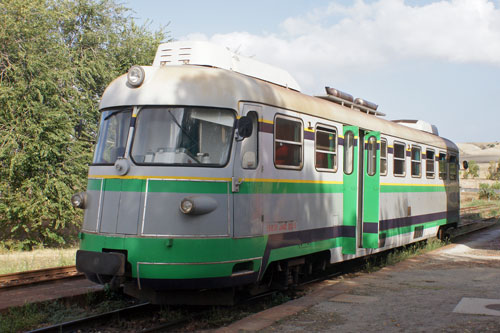
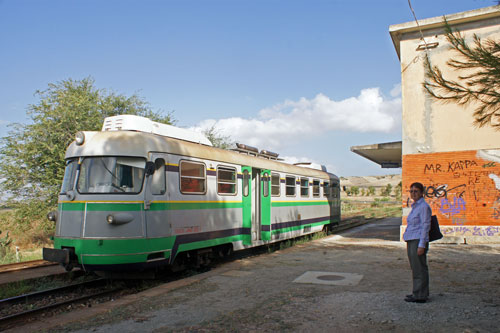
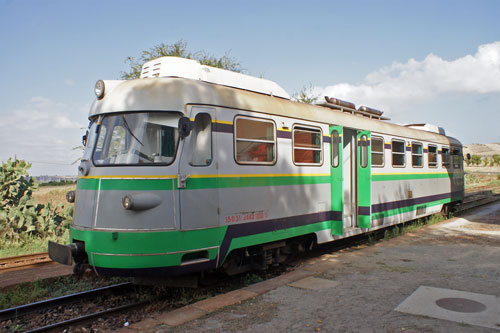
Back at Monserrato-Gottardo, the
railcar returned to Monserrato-Stazione for a crew break
Unfortunately I did not get an image with both railcar and modern tram
together
Photos: © Ian Boyle,10h October 2010
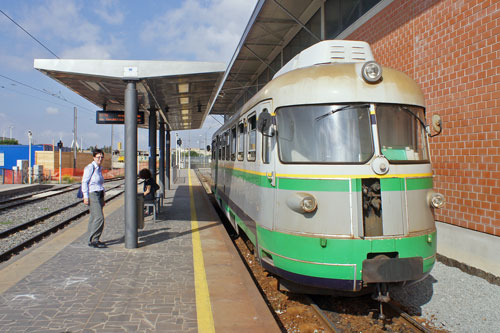
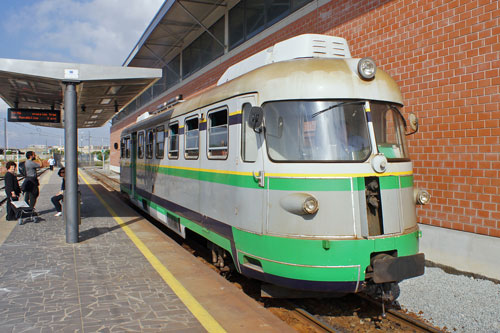
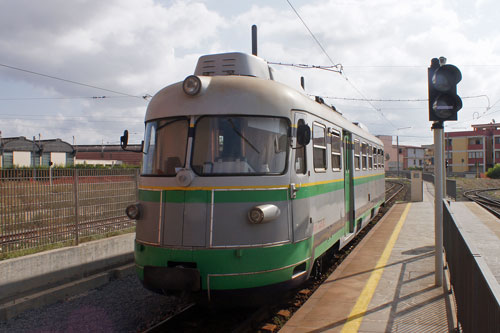
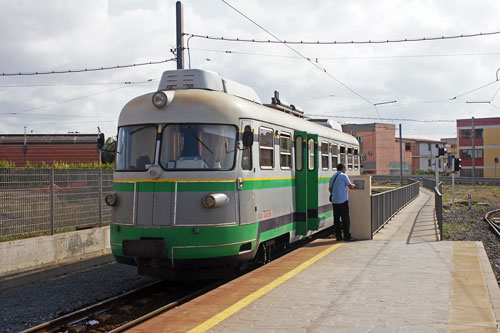
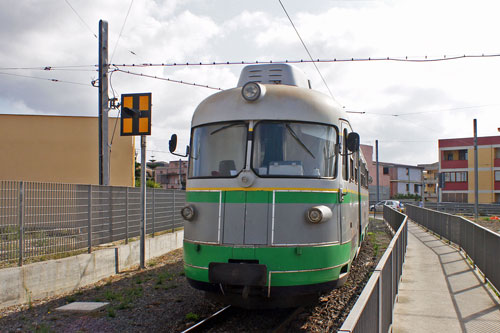
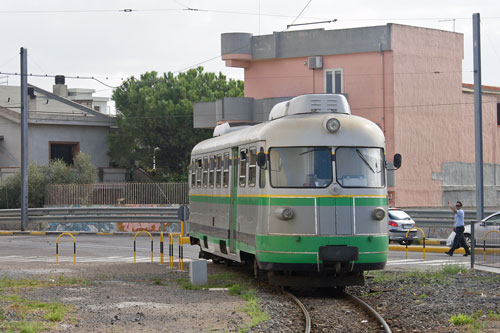
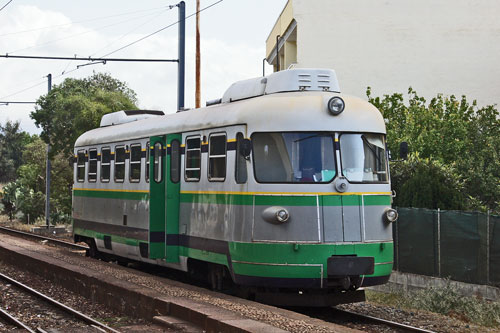
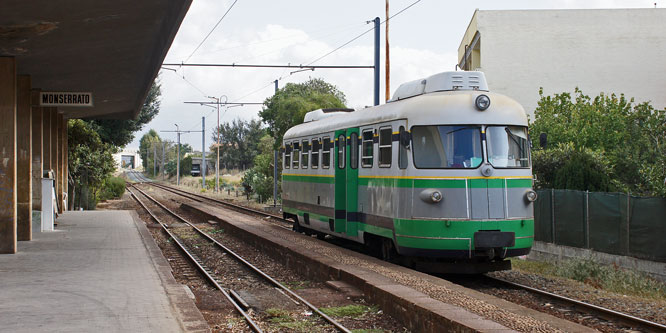
In 2009 we visited Alghero on
Queen Victoria. We
tendered ashore and walked to Alghero San Agostino - only 2km but felt much
further in August heat. It is a shame that the railway was cut back to San
Agostino - it used to run down to the sea front and then along to the port
where tenders had dropped us.
Alghero is on a branch to Sassari, from where there
are other branches to Sorso and Nulvi. The line continues from Nulvi across
the north of Sardinia to Palau on the coast, but this is classed as a
Trenino Verde which receives minimal maintenance, and is used by summer
tourist trains only, typically in one day a week. This runs on Wednesdays
only (we were there on a Tuesday) from Sassari to Tempio (about half way to
Palau), with a connection from Alghero at 8.07am. This trip gives a lengthy
five hours in Tempio, not returning passengers to Alghero until 19.18 -
quite a long day. According to the web timetables for our visit, we could
catch the 9.47am to Sassari, and then the 11.00am into the mountains at
Nulvi. Unfortunately the trains between Alghero and Olmedo had been
'bustituted' due to major track rebuilding, with train between Olmedo and
Sassari. Trains left Sassari at the published times, but returned from
Olmedo almost immediately. The 9.47am bus departure from Alghero was
therefore put back to 10.04, giving a very tight connection onto the 11.00am
from Sassari to Nulvi. In the event, we were delayed by a crew changes just
outside Sassari and the 11.00am surprisingly departed exactly on time as I
ran towards it. I did get some photos however. Having missed the onwards
connection we immediately returned to Alghero.
Alghero San Agostino - no trains
today
Photos: © Ian Boyle, 25th August 2009
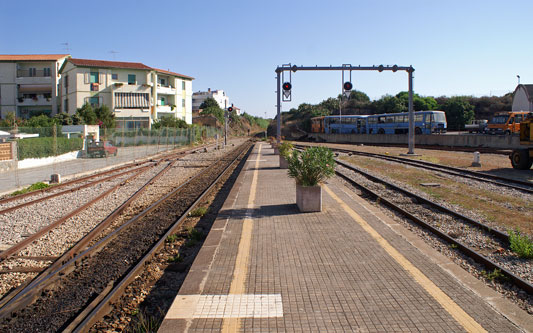
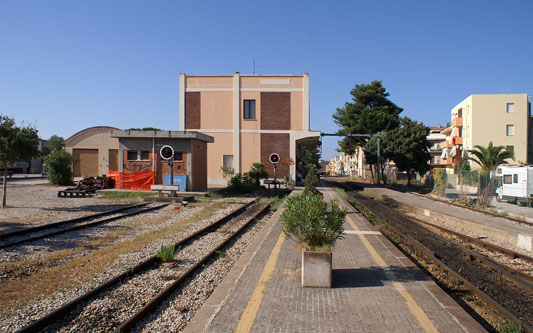
Train arriving from Sassari at
Olmedo where we had been bussed
Two car train with RPm155 control trailer leading a unidentified ADm50 power
car
Photos: © Ian Boyle, 25th August 2009
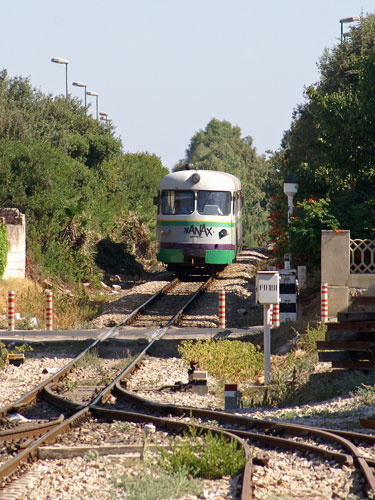
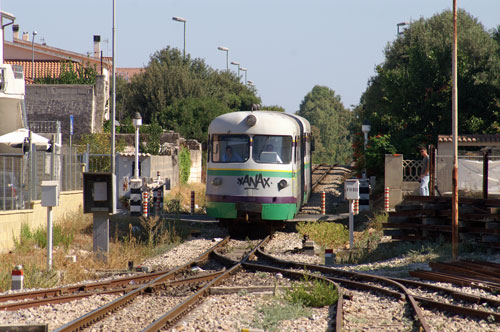
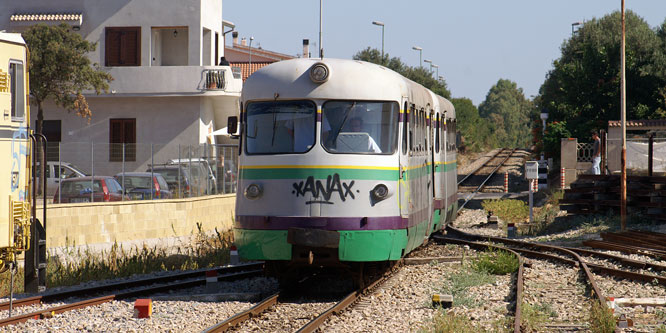
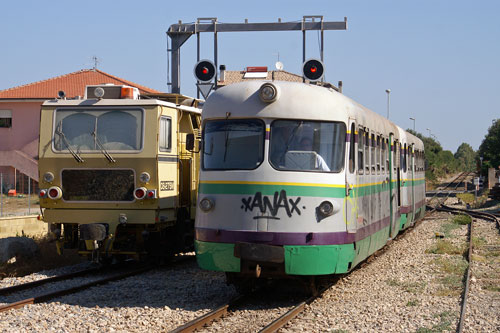
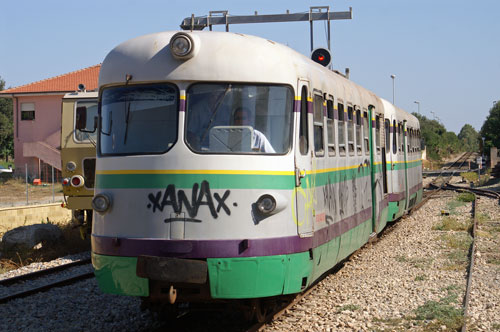
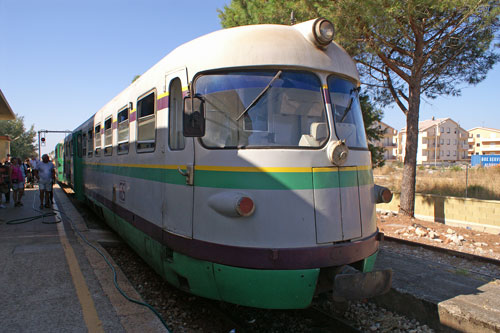
Train at Sassari - Alghero
trains use dual gauge through Platform 1
Two car train with RPm155 control trailer and an unidentified ADm50 power
car
Photos: © Ian Boyle, 25th August 2009
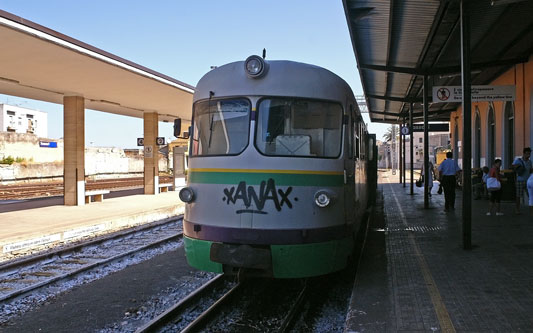
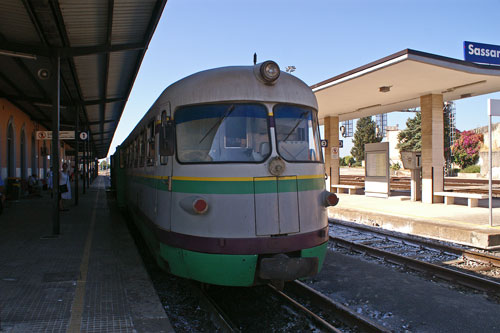
ADm55 leaving Sassari for Nulvi
Trains to Sorsi and Nulvi use the two bay platforms
Photos: © Ian Boyle, 25th August 2009
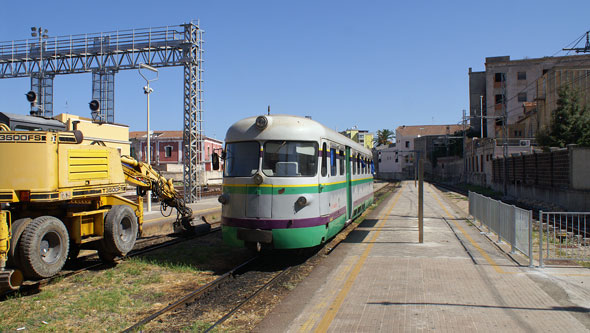
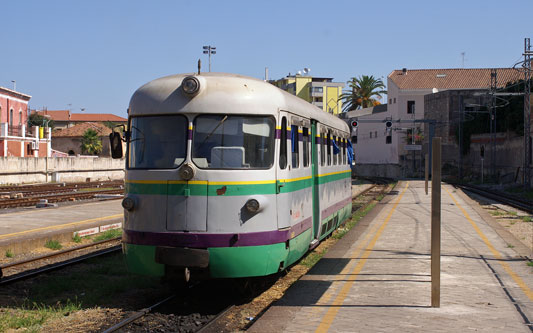
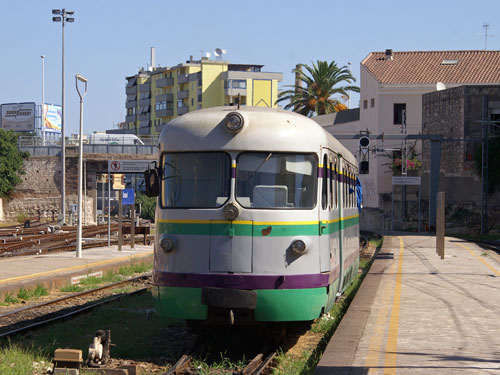
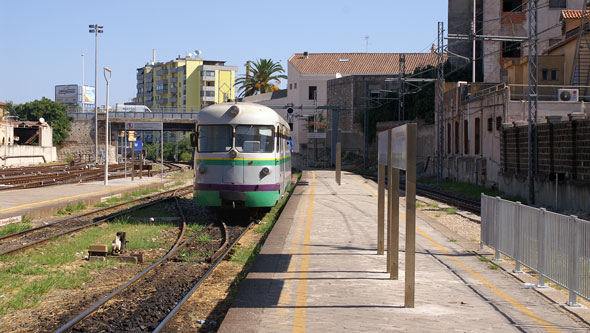
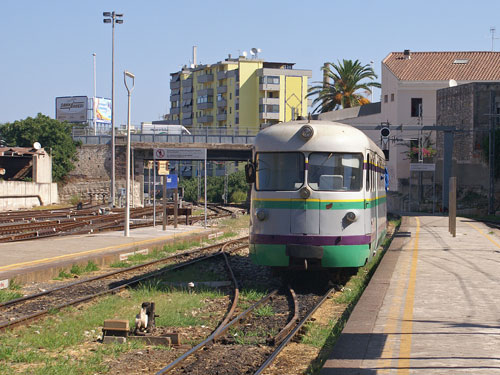
RPm155 and the unidentified
ADm50 power car back at Olmedo
Contractor's diesel shunter also in the station
Photos: © Ian Boyle, 25th August 2009
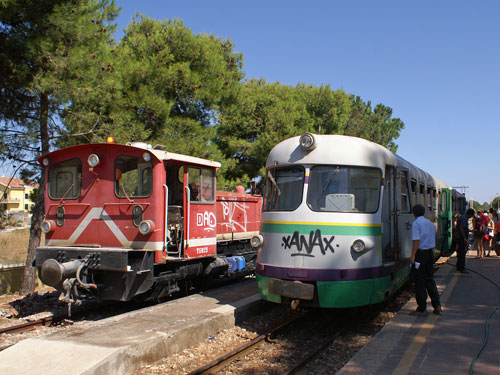
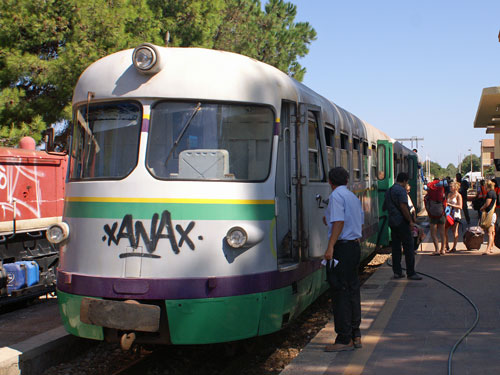
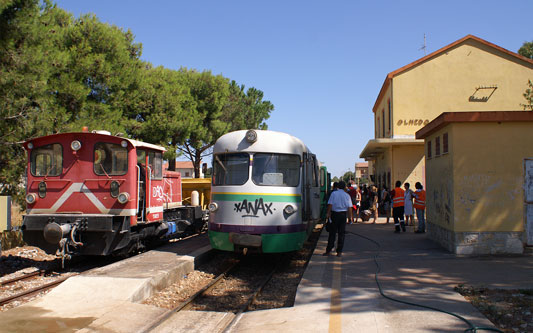
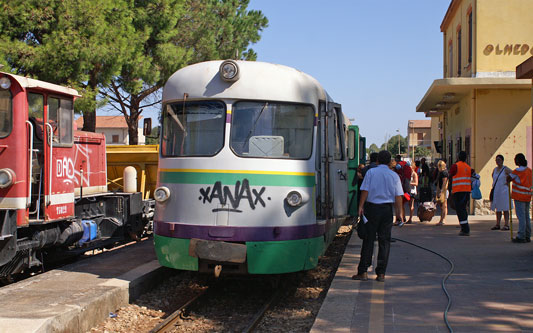
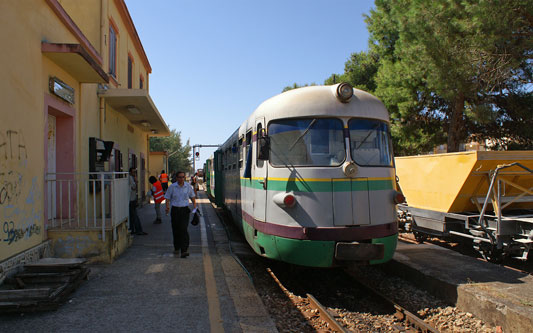
In 2011 we revisited Alghero on
Grand Princess.
Track upgrading between Alghero and Sassari has been completed and trains
were running normally. The local graffiti artists seem to prefer the larger
flat canvas of the 1990s Breda railcars compared to the curvaceous FIATs and
ADe97 which took us to Sassari seemed to have suffered particularly badly.
We devoted our time in Sassari to the new
Metro, before returning to
Alghero on the same set.
Alghero San Agostino station,
showing the large station building built when the railway was cut back from
the port.
The two-road railcar depot is also shown, but now appears to be out of use.
Photos: © Ian Boyle, 26th October 2011
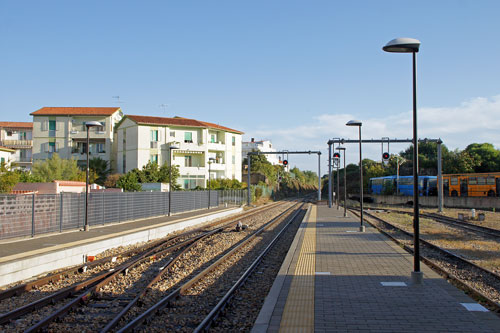
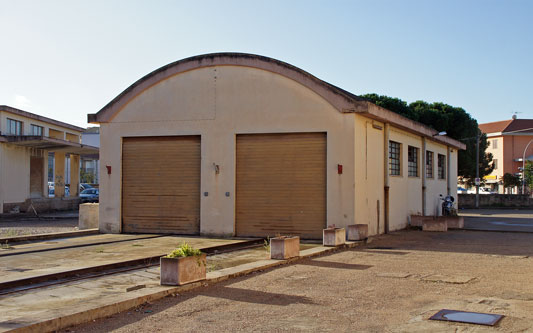
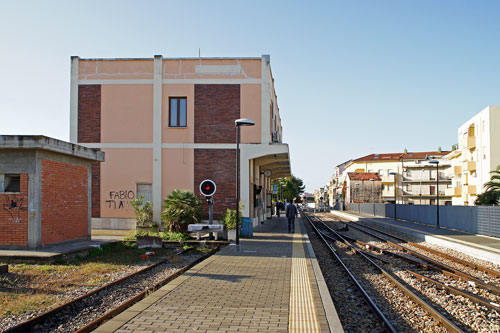
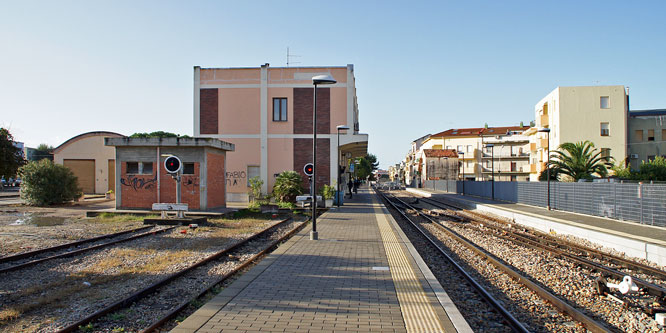
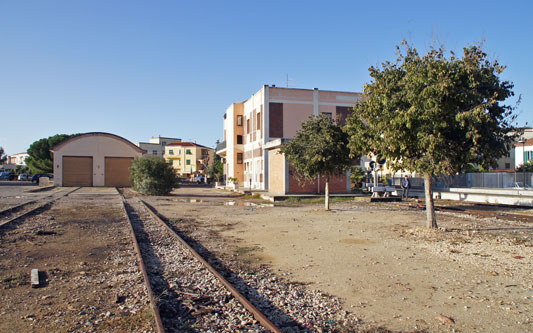
Breda
railcar ADe97+RPe904 arriving at Alghero from Sassari
Photos: © Ian Boyle, 26th October 2011
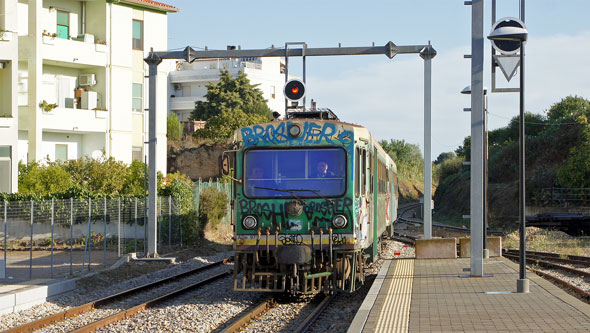
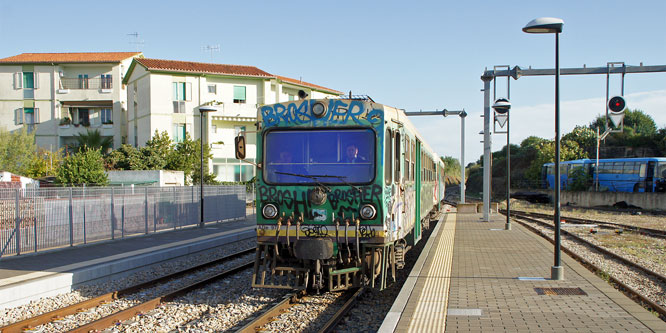
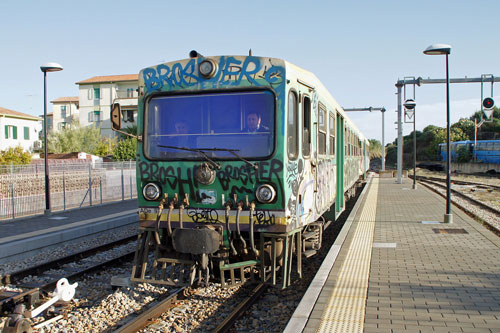
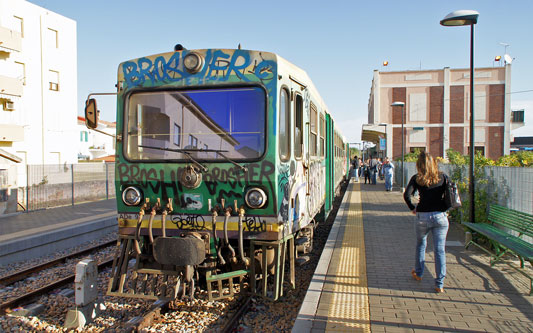
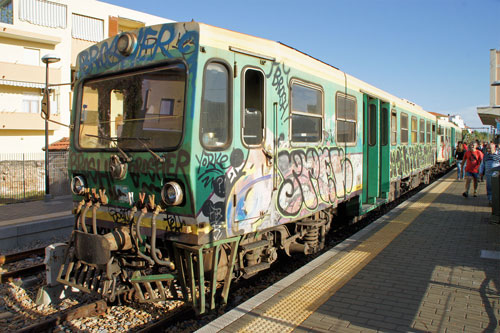
Breda
railcar RPe904 (towed by ADe97) arriving at Alghero from Sassari
Photos: © Ian Boyle, 26th October 2011
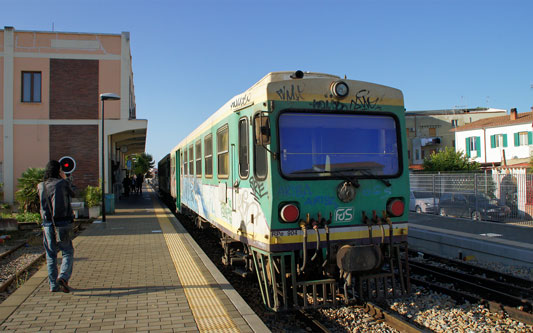
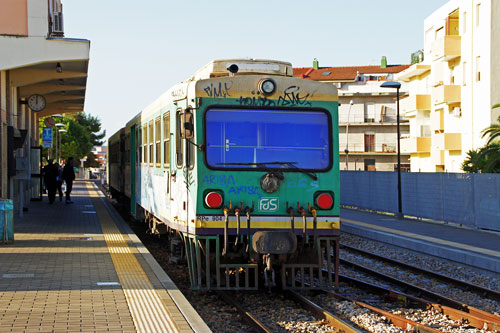
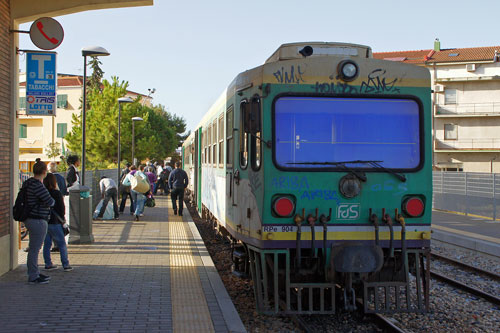
Breda
railcar RPe904 (with ADe97) having arrived at Sassari from Alghero
Photo: © Ian Boyle, 26th October 2011
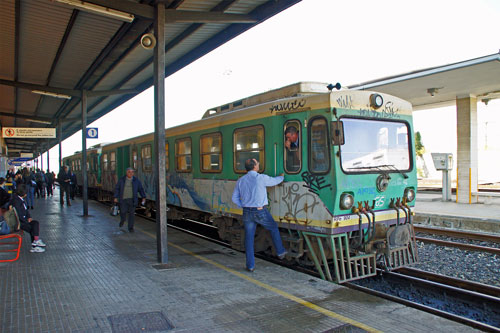
FIAT
railcars ADm55+ADm52+RPm154 arriving at Sassari from Sorso for the busy
afternoon school service
Photos: © Ian Boyle, 26th October 2011
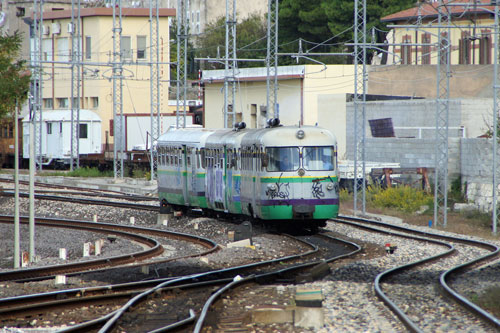
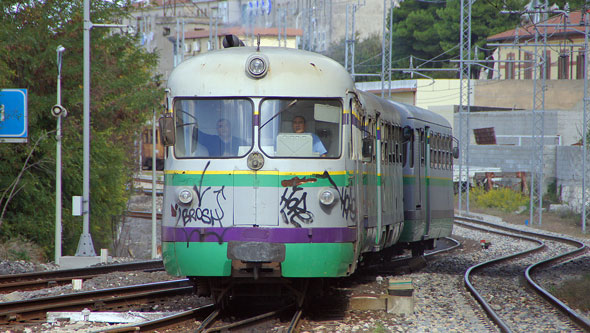
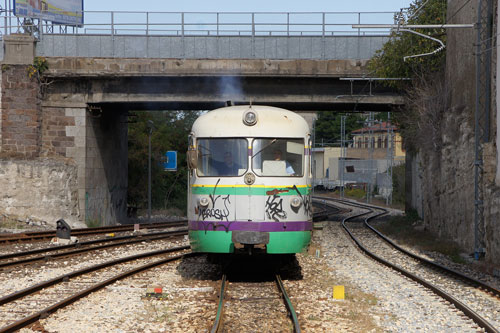
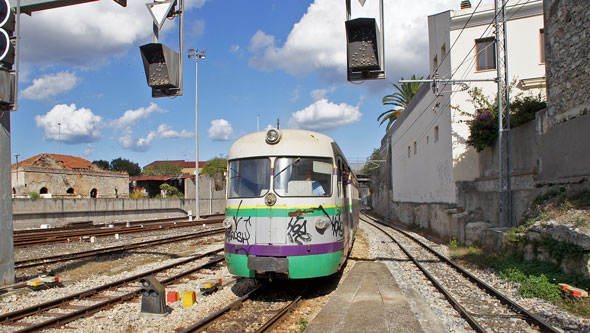
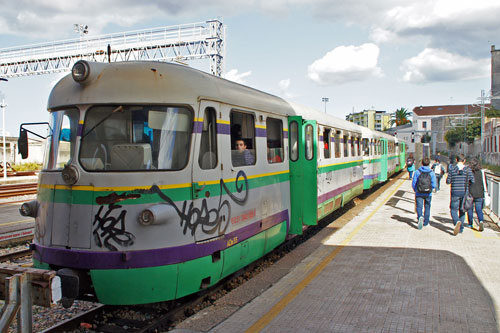
AnsaldoBreda Sassari Metro tram and FdS FIAT
railcars at Sassari
Photos: © Ian Boyle, 26th October 2011
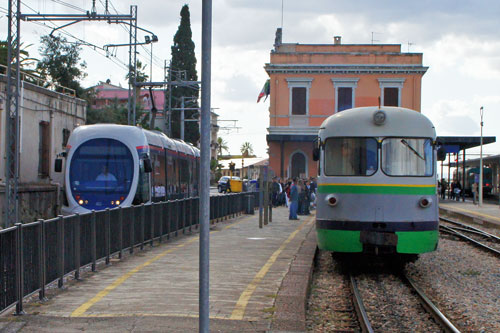
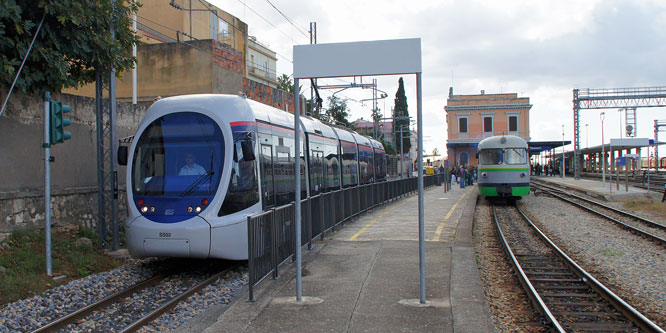
FIAT
railcars ADm55+ADm52+RPm154 at Sassari loading for the busy afternoon school
service to Sorsi
Photos: © Ian Boyle, 26th October 2011
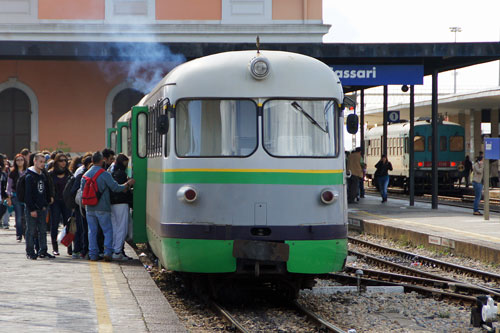
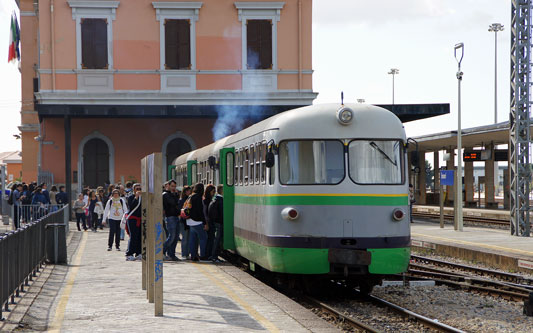
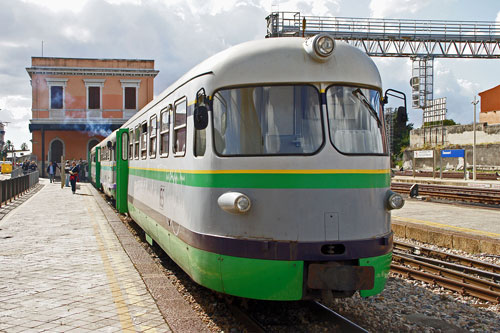
Breda
railcars ADe97 + RPe904 arriving from the depot at Sassari before taking the
train back to Alghero
Photo: © Ian Boyle, 26th October 2011
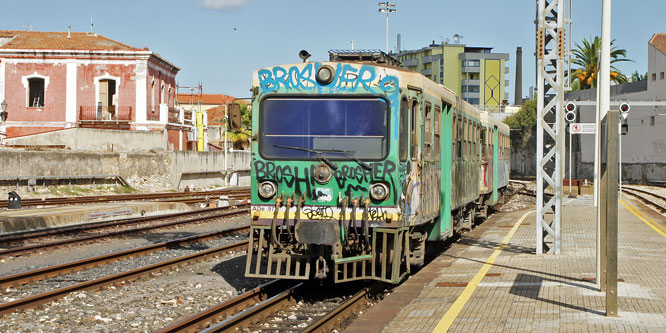
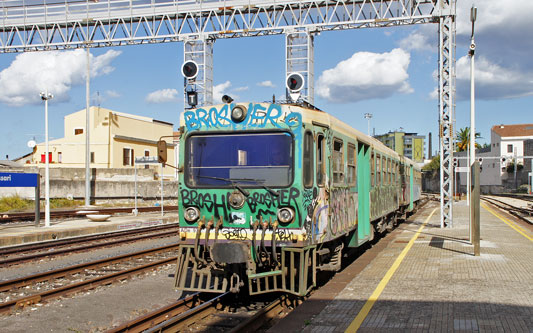
Breda
railcars ADe97 + RPe904 having arrived back at Alghero
Photo: © Ian Boyle, 26th October 2011
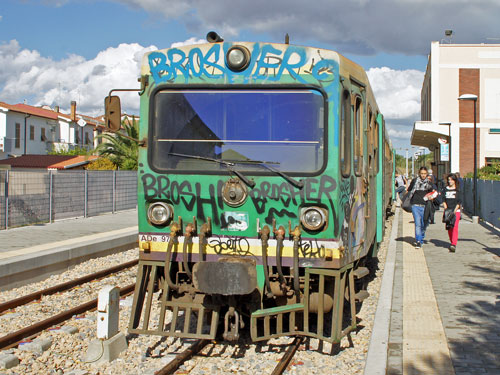
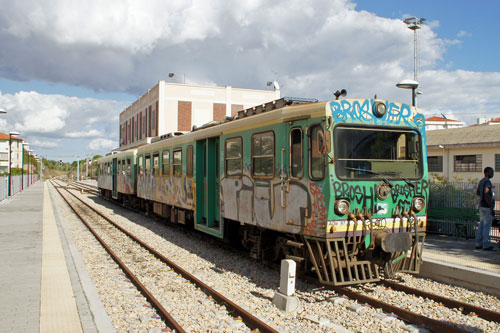
Images of a trip on the Tren Verde tourist service
from Tempio Pausania on the Sassari-Palau line by Mike Tedstone in 2011, as
he describes below:-
Whilst on a week's cruise onboard Thomson Destiny from Palma,
Majorca, one of the shore excursions on offer from the half-day call at
Olbia, Sardinia on Tuesday 11 October 2011 was to an island railway -
location unspecified - for a charter-train ride through the countryside of
north-eastern Sardinia, to include wine-tasting and local delicacies. Two
bus-loads of passengers left the port of Olbia and after an hour's tour
through gentle, hilly countryside arrived at the town of Tempio Pausania. No
maps were available, but it soon became obvious that the charter-train ride
was to start from the very large (but otherwise disused) station which was
roughly midway on the narrow-gauge route linking Sassari (in the NW of the
island) to Palau, in the north. Despite the notional 1030 departure the
diesel-loco only came off shed at 1020, and the two carriages (each with
about 64 seats) were still being watered at 1030. No former railway land
appeared to have been flogged off despite the effective withdrawal of all
services in (I think) the 1990s, after which the Tren Verde tourism
initiative appeared to have prompted resurrection of very occasional tourist
runs, plus charters such as this for Thomson Cruises.
The train set off on what was described as a roughly two and a half hours
journey, with the snacks plus wine stop after about an hour and a quarter at
an unnamed but newly provided halt, with generous shelter from the sun, near
a lake. This stop was of fundamental importance to many of the passengers,
rather than being aimed at railway enthusiasts, with emphasis on the local
nature of what was on offer. Duly refreshed, the train was re-boarded for
about a half-hour run to Arzachena, a good few miles short of Palau on the
coast. Here were waiting the buses for the run back to Olbia ferryport,
where - amongst others - the old Tor Britannia had arrived from
Civitavecchia during the morning, now sailing as Moby Drea,
complete with Looney Tunes images. Thomson Destiny then left at
around 1400 for her final call at Mahon, Menorca the next day. It should be
noted that such advertised public trips that did run in 2011 on this section
of the once-extensive Sardinian metre-gauge network had long since ceased
after the summer period, making the charter train the only means of seeing
the railway in the Autumn.
Tren Verde in 2011
Photos: ©2011 Michael Tedstone
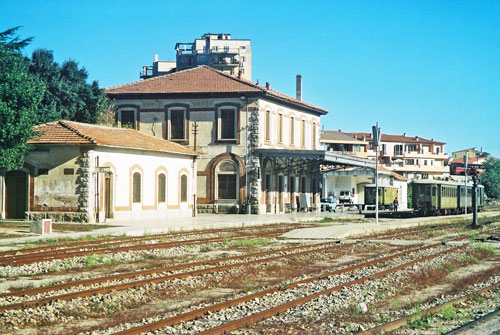
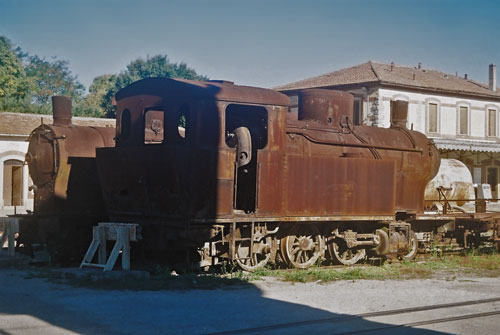
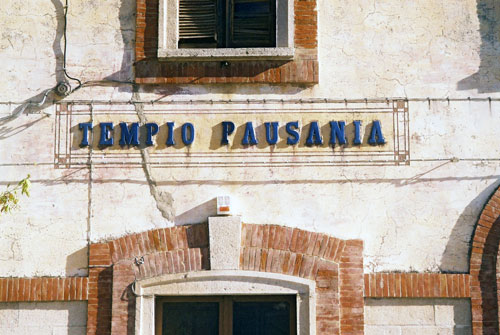
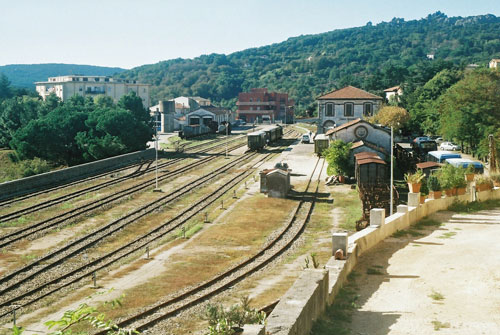
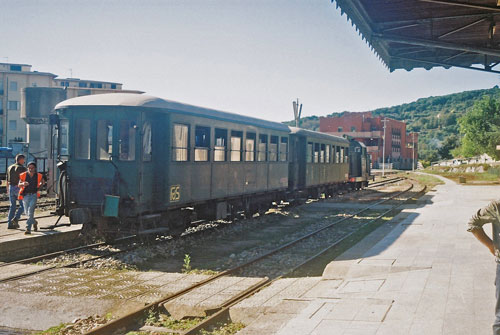
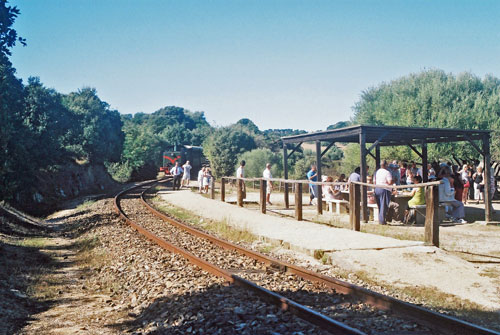
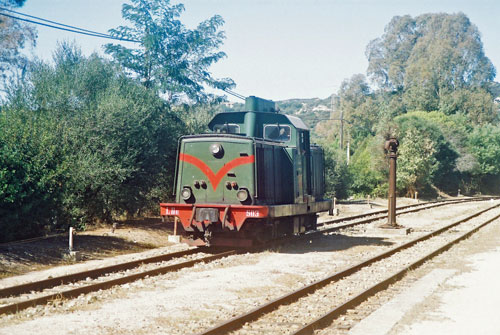
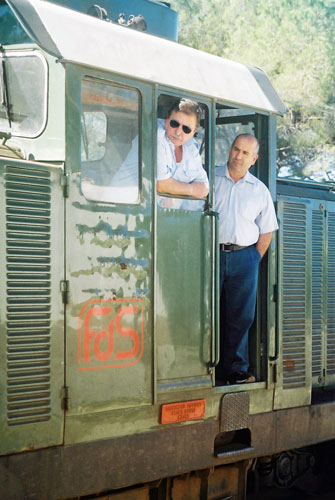
FdS acquired 23 steam locos when it was formed in 1989, although quite a few
of these were already out of use and in some cases derelict. FCS provided
seven Breda 2-6-0T locos of 1914, four 2-8-0T locos by Orenstein & Koppel
(1914, rebuilt as 0-8-0T in 1916) and a couple of German Mallets from 1909 &
1913. Their newest steam locos were three 2-6-2T by Reggio Emilia of 1931.
SFS supplied six 2-6-0T locos by Breda and CEMSA from 1930/31.
About half a dozen steam locos were restored either for the Monserrato
Museum or for use on Tren Verde tourist services.
Breda 2-6-0T locos at Tempio
Pausania
Photo: ©2011 Michael Tedstone

SFS 3 NULVI at Sassari,
built Breda in 1930
Photos: ©2011 Ian Boyle
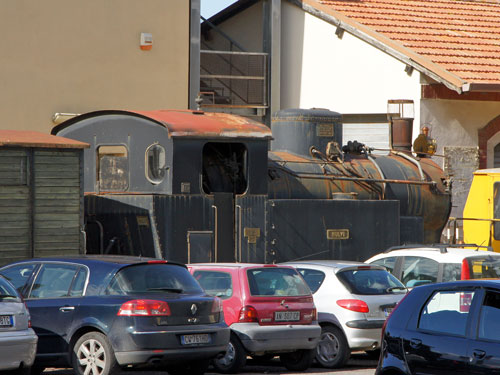
SFS 5 LAERRU at
Sassari, built Breda in 1930
Photos: ©2011 Ian Boyle
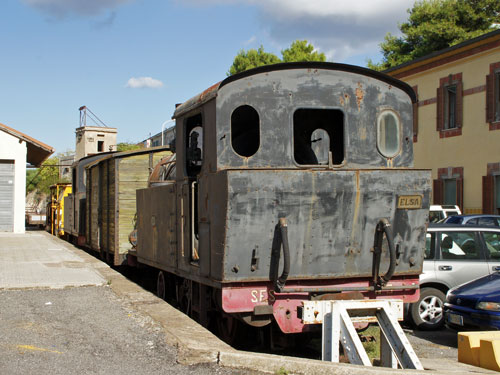
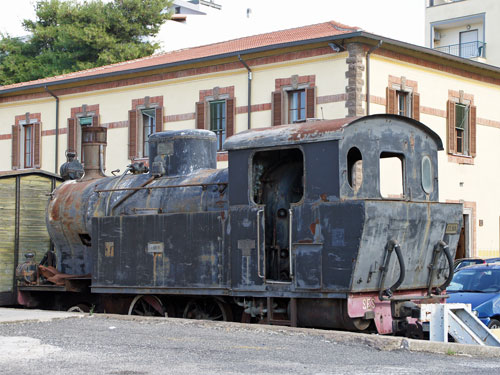
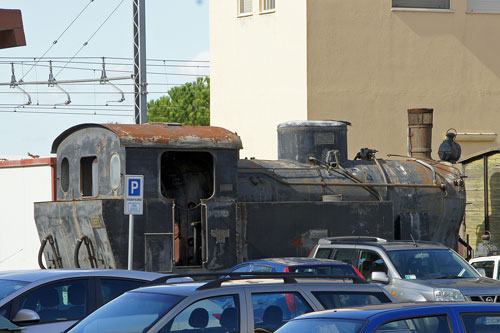
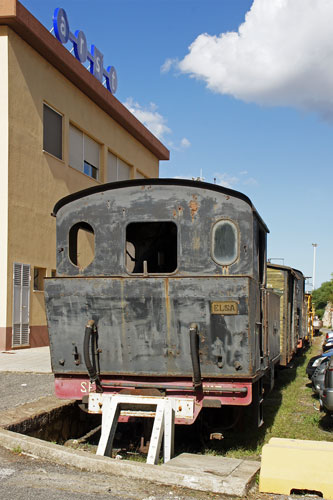
Orenstein & Koppel 2-8-0T at the
Monserrato Museum
Photographed with difficulty through the closed museum gates
Photos: ©2010 Ian Boyle
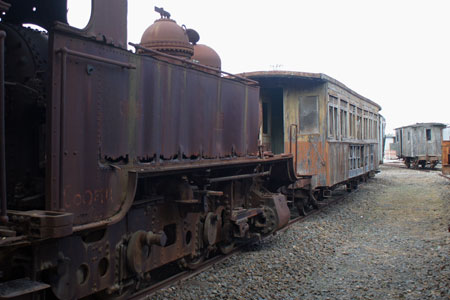
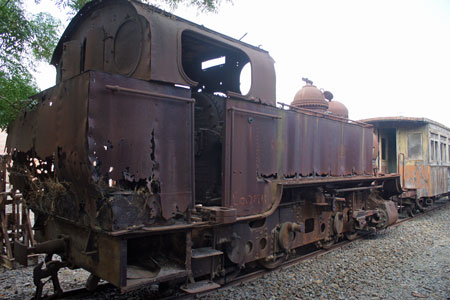
FdS has three main classes of diesels. Class LM1 were built in 1953 by
Orenstein & Koppel (Type MV4) and were used on all parts of the FdS system.
Breda built diesels LDe501-504 for SFS in 1958 for services out of Sassari.
Similar Breda locos of class LDe600 were built for the FCS and used at
Macomer and Cagliari. All passed to the FdS in 1989. Most passenger trains
are now run with diesel railcars, but the Tren Verde tourist services are
generally hauled by diesel locos, due to problems with the steam locos
causing fires. In addition there are a number of small diesel shunters used
by the contractors who are rebuilding many sections of the railways.
Breda built diesels LDe501-504 for SFS in 1958 for services out of Sassari.
They are similar to class LDe600 for the FCS and used at Macomer and
Cagliari. All passed to the FdS in 1989.
Breda LDe503
LDe501 class diesel No.503 on a
Tren Verdi tourist service
Photos: ©2011 Michael Tedstone


FIAT built 20 diesel-electric railcars for the FCS system in 1957 for use on
the lines from Cagliari and Macomer. They are numbered ADe 001-020 and many
survive. ADe units are powered by two 185kW FIAT engines and have four 44kW
traction motors. They are geared for a maximum of 75km/hr and originally
carried 15 x 1st and 40 x 2nd Class passengers. They are now single class.
Weight is 28 tonnes. They can run with control trailers RBe 101-110.
Six further similar units 301-306 were built for the FMS system based at San
Giovanni Suergiu in 1959. These were geared for 90 km/hr. They were
transferred to Cagliari and Macomer when the FMS closed in 1975. They can
run with control trailers RP 351-354.
ADe010
FIAT ADe railcar 010, based at
Monserrato (Cagliari)
Photos: © Ian Boyle,10h October 2010
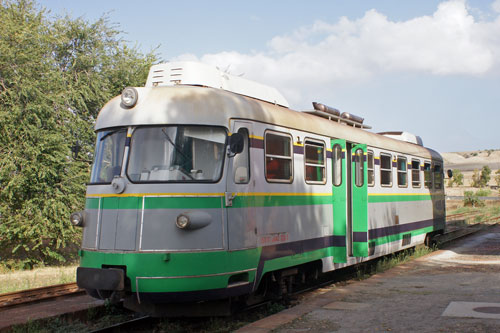
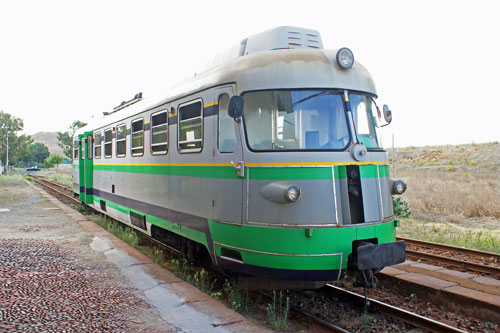
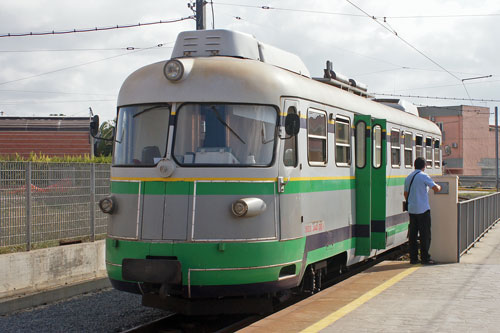
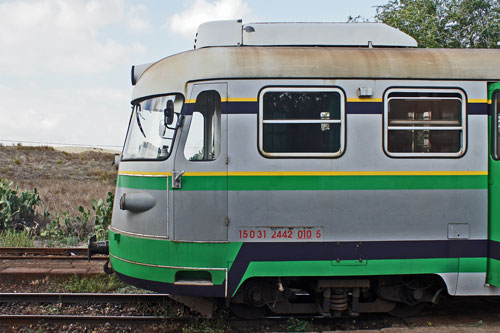
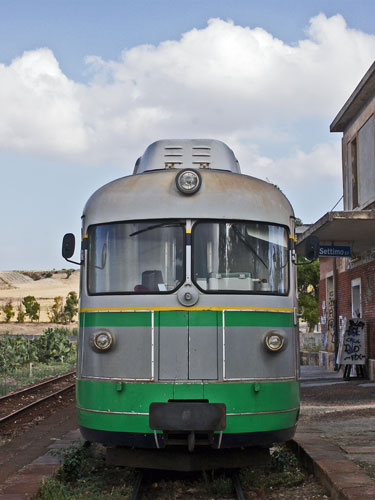
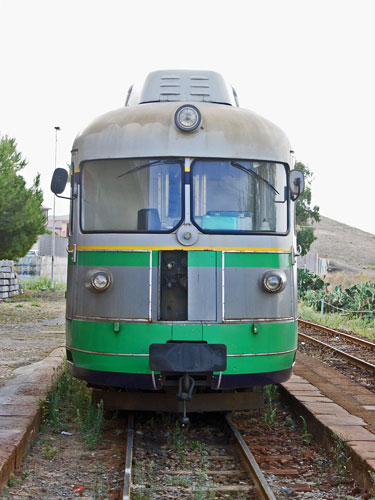
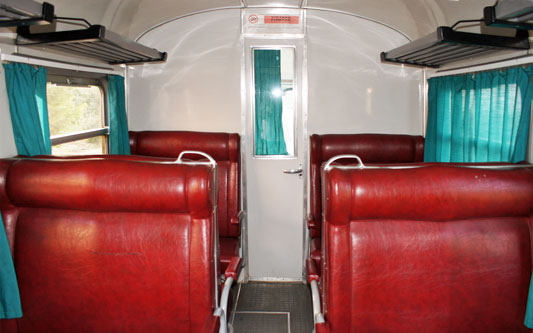
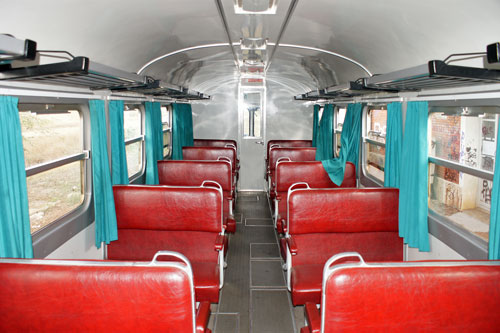
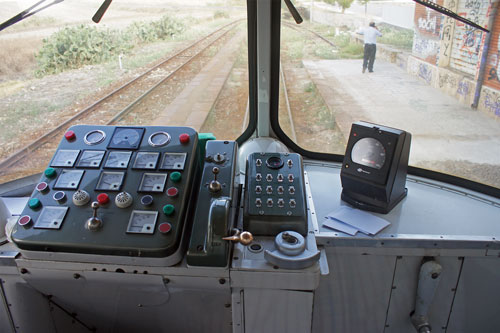
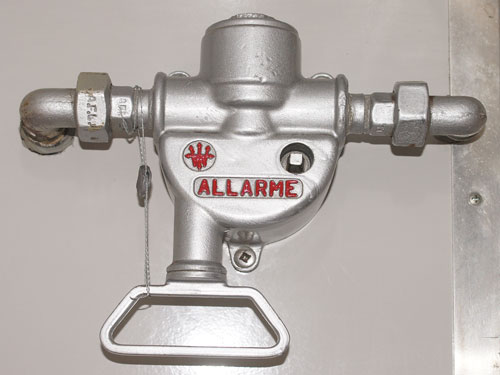
RPe Trailer
Unidentified FIAT RPe trailer
based at Monserrato (Cagliari)
Photo: © Ian Boyle,10h October 2010
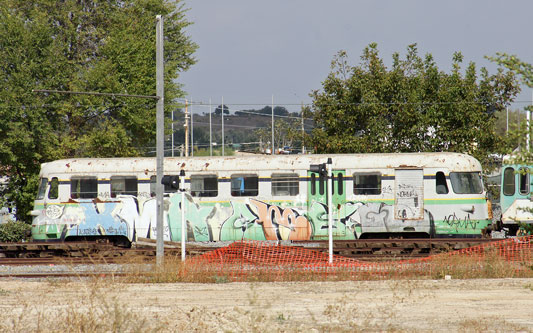
FIAT built 11 diesel-mechanical railcars for the SFS system in 1957 for use on
the lines from Sassari. They are numbered ADm 051-061 and many
survive. They were delivered as ADm 001-011. ADm units are powered by two 185kW FIAT engines and
mechanical transmission. They are noisier than the ADe diesel-electric sets
and the mechanical transmissions whine like AEC Regent V buses. They a maximum of 72km/hr and originally
carried 15 x 1st and 40 x 2nd Class passengers. They are now single class.
Weight is 24 tonnes. They can run with control trailers RPm 151-158.
ADm50 Class
Unidentified FIAT ADm railcar
based at Sassari
Photos: © Ian Boyle, 25th August 2009
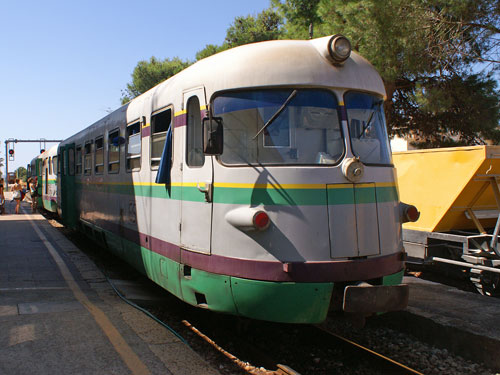
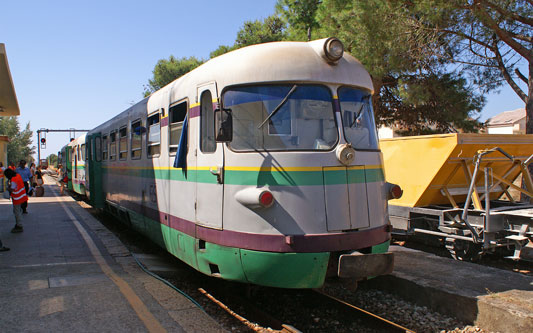
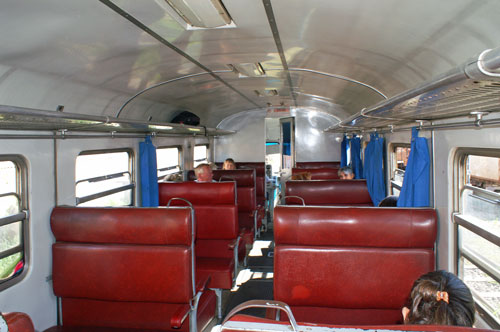
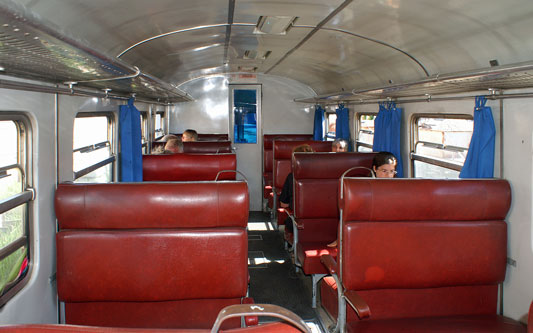
ADm52
FIAT ADm52 railcar based at
Sassari
Photos: © Ian Boyle, 25th August 2009
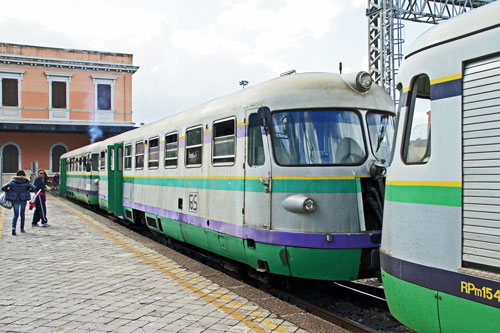
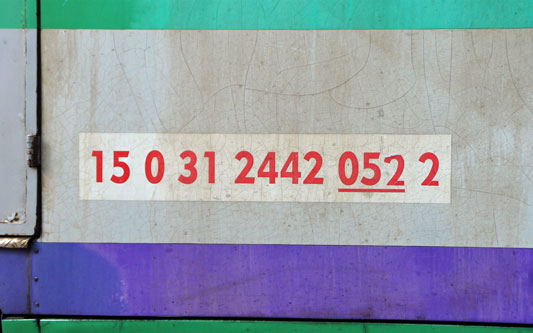
ADm55
FIAT ADm55 railcar based at
Sassari
Photos: © Ian Boyle, 25th August 2009

 FIAT ADm55 railcar based at
Sassari, looking rather worse for wear than in 2009
FIAT ADm55 railcar based at
Sassari, looking rather worse for wear than in 2009
Photo: © Ian Boyle, 26th October 2011
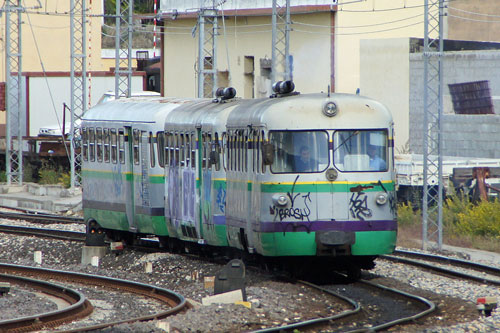
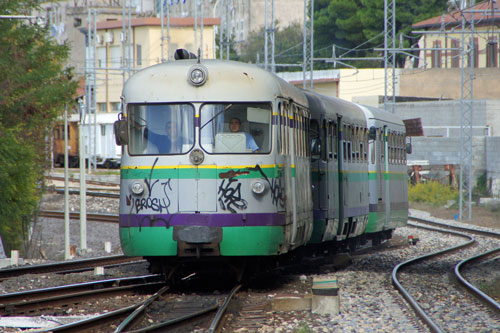
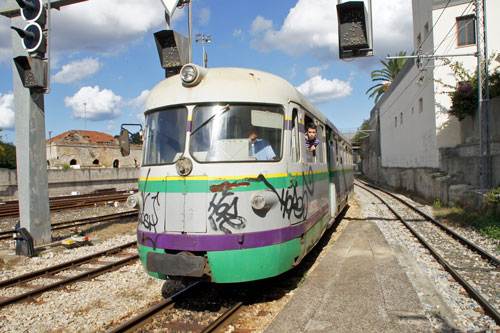
RPm154 Trailer
FIAT RPm154 trailer based at
Sassari
Photo: © Ian Boyle, 26th October 2011
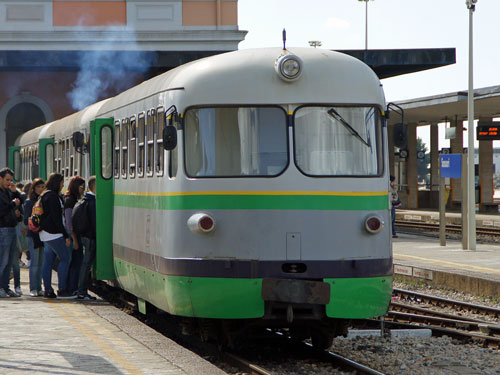
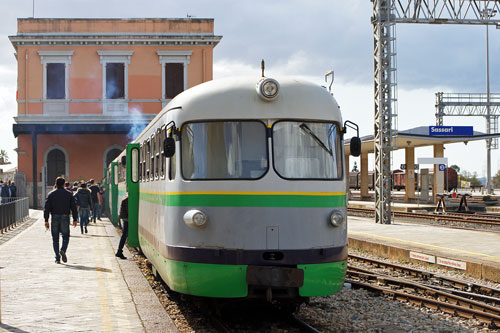
RPm155 Trailer
FIAT RPm155 trailer based at
Sassari
Photo: © Ian Boyle, 25th August 2009
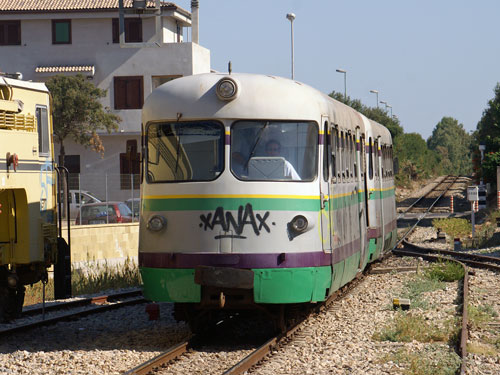

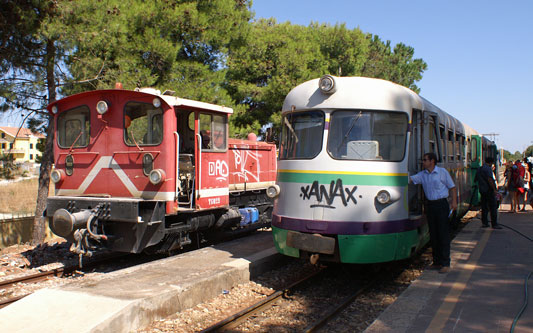
The Breda class ADe90 units are the most modern on the system, numbered
ADe91-98. They can run with control trailers RP 901-905. Examples of ADe90
exist on all three systems based at Cagliari, Macomer and Sassari, but
trailers are at Cagliari and Sassari only. The power cars have two FIAT 184
kW engines, they weigh 32 tonnes and are geared to a maximum of 100 km/hr.
These units seem particularly popular with the local graffiti artists.
ADe92 & ADe95
Breda ADe90 railcars Ade95 and
ADe92, based at Monserrato (Cagliari)
Photo: © Ian Boyle,10h October 2010
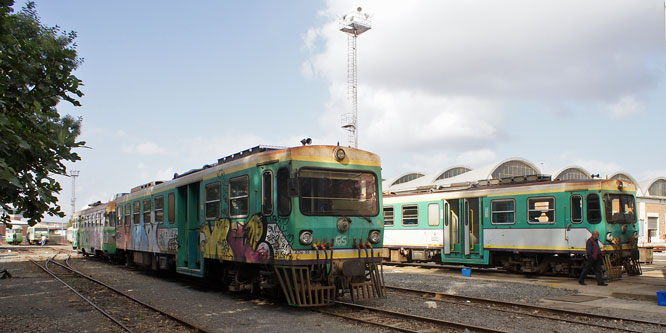
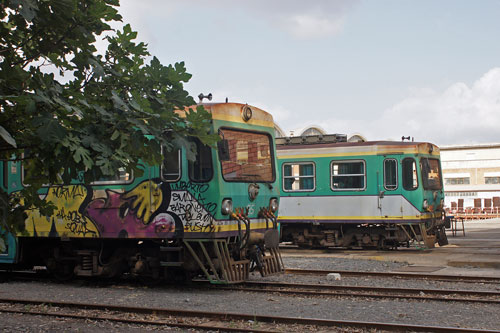
ADe95
Breda ADe90 railcar Ade95, based
at Monserrato (Cagliari)
Photo: © Ian Boyle,10h October 2010
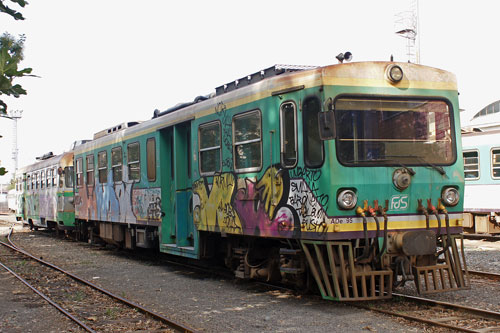
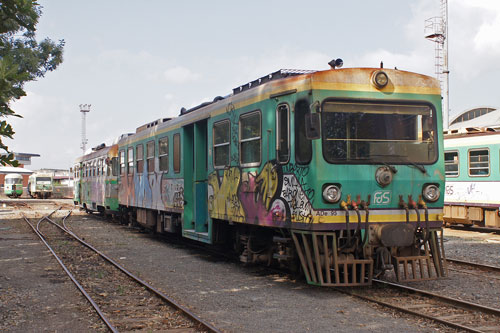
ADe97
Breda ADe90 railcar Ade97, based
at Sassari
Photo: © Ian Boyle,25h October 2011
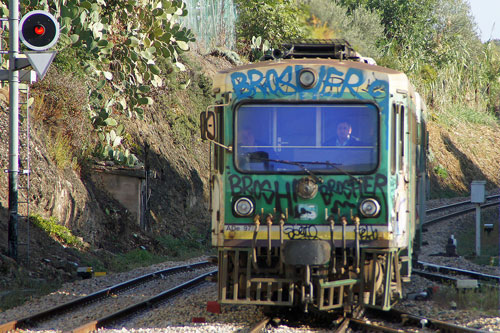
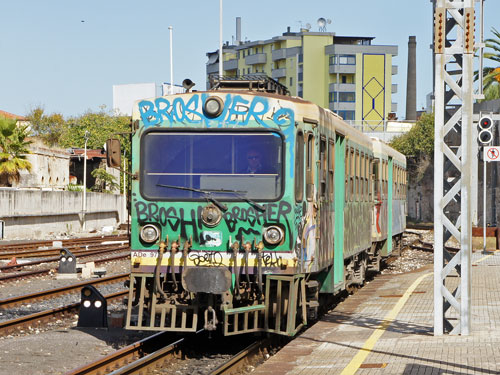
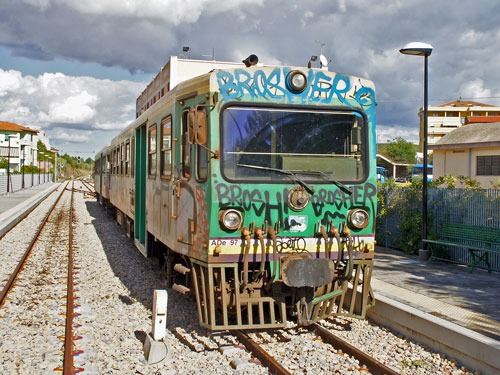
ADe90 Class
Unidentified Breda ADe90
railcar, based at Monserrato (Cagliari)
Photo: © Ian Boyle,10h October 2010
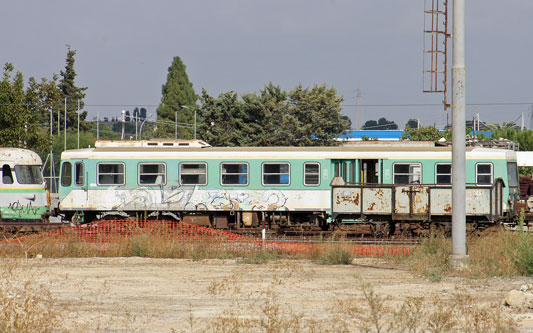

 The 950mm gauge railway from Cagliari running north
to Isili and Sorgono was opened by the Strade Ferrate Secondarie della
Sardegna (SFSS) in 1889. The section from Isili to Sorgono is now only used
by occasional tourist trains. A long branch was also built from Mandas to
Arbatax on the coast, also still available for tourist trains.
The 950mm gauge railway from Cagliari running north
to Isili and Sorgono was opened by the Strade Ferrate Secondarie della
Sardegna (SFSS) in 1889. The section from Isili to Sorgono is now only used
by occasional tourist trains. A long branch was also built from Mandas to
Arbatax on the coast, also still available for tourist trains. 

































































































































































